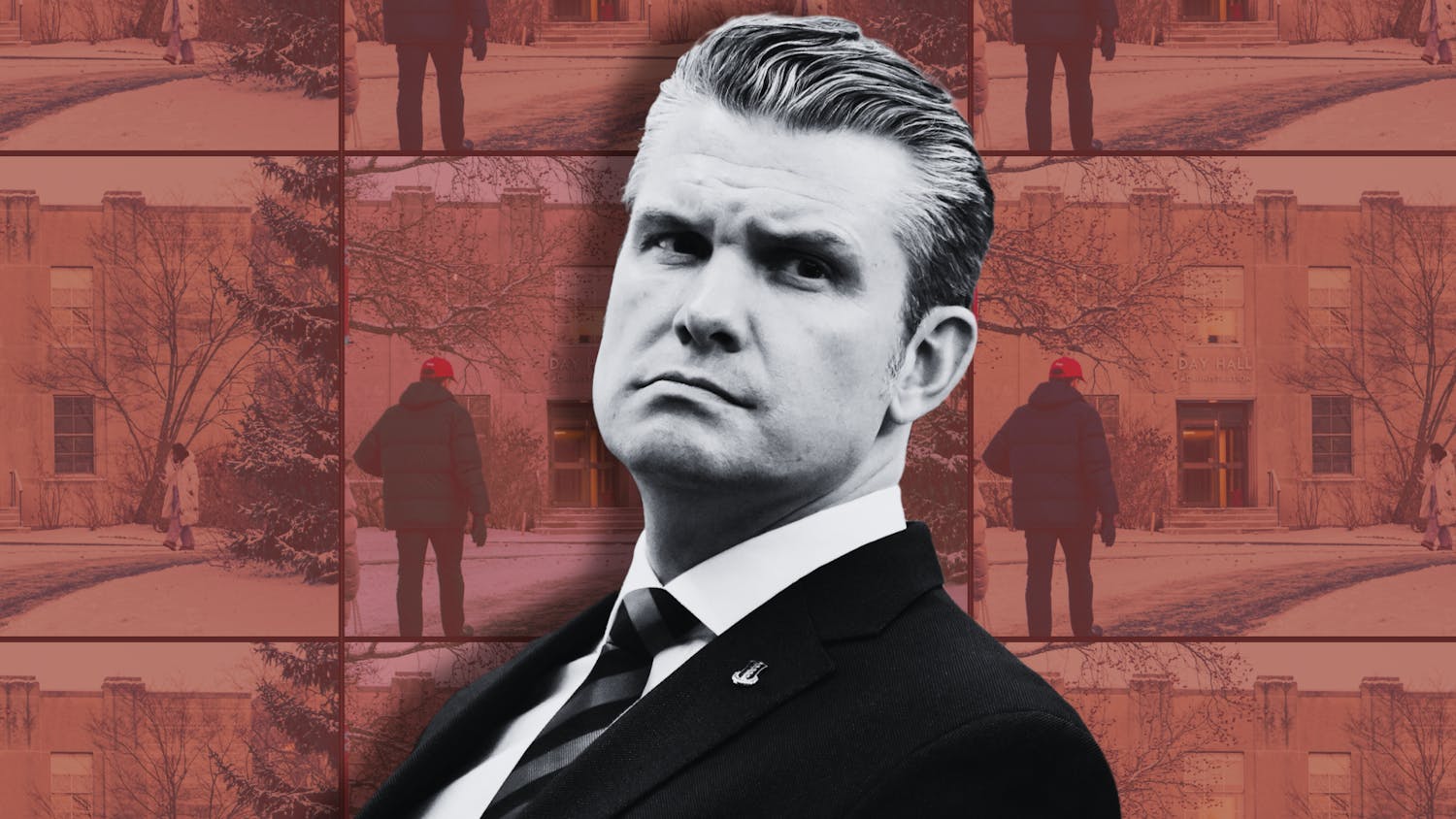Hours before the moment in 2015 that sparked a Cornell Title IX investigation and two lawsuits, Sally Roe and James Doe began their nights as many students do in college towns across the country, by leaving a fraternity house and venturing off campus to locate a party.
The two students, whose real names The Sun is withholding, spent about an hour in Ithaca’s Collegetown before returning to the fraternity house — Doe’s — and receding to Doe’s bedroom alone.
What happened next was the subject of a nearly five-month-long Cornell Title IX Office investigation based largely on text messages, a friend who spoke to Roe later that night and a Title IX investigator’s assessment of each student’s credibility. The investigator’s ultimate decision that Doe should be suspended for at least a year was later overturned by the University’s highest appellate panel for Title IX investigations, and Doe is suing the University for what he says was a “fatally flawed” investigation.
Cornell requires all parties to keep confidential anything they learn in the course of Title IX investigations, meaning the Title IX Office’s inner workings are rarely exposed to the public. Court documents from one of Doe’s two lawsuits give an inside look at how the University’s Title IX Office handled the complex case, shedding light on how at least one Title IX investigator came to a conclusion.
Elizabeth McGrath, the Title IX investigator whose investigative report happened to become public record, attempted to handle a difficult charge: to find the truth between two irreconcilable narratives.
Both Doe and Roe agree that when they got back to Doe’s room, they began to kiss consensually. Their stories diverge from there, with Roe alleging that Doe took things too far by trying to unhook her bra despite her repeated demands that he not.
Doe ignored her protests and became even more aggressive, Roe alleges, violently yanking her hair, lacing his fingers around her neck and choking her for about five seconds. As a matter of self-defense, Roe says, she punched Doe’s genitals and left the room.
Doe’s story is different.
After kissing consensually, Doe says Roe pinned his wrists to his bed, sat on top of him and began kissing him aggressively, gestures that made Doe uncomfortable since he had been sexually assaulted in the past, he said.
Doe says he asked Roe to be more gentle, but, when she refused, tried to shift Roe off his body by placing his hand on her collarbone and firmly pushing. Less than half a second after he put his hand on Roe’s collarbone, Roe punched him in the genitals, he says.

‘Appearance, Demeanor and Frankness’
The evidence in the case of Doe and Roe did not point overwhelmingly to one conclusion. Asked which party they thought was more truthful, most witnesses — including the two closest to the situation — said they did not know. McGrath, who no longer works at Cornell, wrote in the investigative report that she would have to rely on her own “commonsense [sic], life experience, knowledge of human nature, and good judgment” to render a decision. The investigator began her report by considering the parties’ “general credibility and character,” including “appearance, demeanor and frankness.” Asked how investigators assess such characteristics, Title IX Coordinator Sarah B. Affel told The Sun that “Cornell provides extensive internal and external training” to investigators “on all aspects of their jobs, and consistent with federal and state laws, regulations and guidance on training.” After discussing her impressions of the parties — including her feeling that Doe was socially awkward — McGrath’s credibility analysis involved looking for inconsistencies in their stories. The investigator found several inconsistencies in Roe’s account. Roe originally said she met Doe in Collegetown rather than in his fraternity house, falsely said she had never been to Doe’s fraternity house before that night, and initially failed to tell McGrath that she was friends with one of Doe’s fraternity brothers, a relevant detail because he was one of the witnesses. McGrath also noted that Roe asked the University to extend Doe’s interim suspension, saying his presence at Cornell gave her anxiety, but returned to Doe’s fraternity house less than 24 hours after their initial encounter and several more times later that week, although she did not interact with Doe during these subsequent visits. These discrepancies were not significant, McGrath said, because they did not “concern the incident at hand” and were “likely a result of [Roe’s] wish to keep details of her life private.”
‘Motive and Opportunity to Lie’
As part of the investigation, McGrath then assessed each party’s “motive and opportunity to lie.” She found that Doe had a possible reason and opportunity to lie, noting that he only complained of being punched in the testicles after the Office of the Judicial Administrator issued him a temporary suspension due to Roe’s initial complaint under the Campus Code of Conduct. The “timing and nature” of Doe’s complaint “supports an inference that it was part of a strategy to lift the [interim] suspension rather than a good faith belief that he was the victim of sexual violence,” McGrath wrote in the Motive to Lie section of the report. McGrath also thought it odd that when Doe’s fraternity brothers confronted him about the choking allegations, Doe responded by saying that Roe should not have considered his actions choking because he is practiced in BDSM. McGrath thought Doe’s reaction in this “unguarded” moment betrayed his candid thoughts since he, directly confronted by this fraternity brothers, had no opportunity to conjure a fake story. The investigator said Doe’s allegedly candid response was “a bizarre response to make while also maintaining that he was the victim.” Doe’s attorney maintains in the federal lawsuit that Doe was never interviewed prior to being given the interim suspension, a claim that court documents support.











